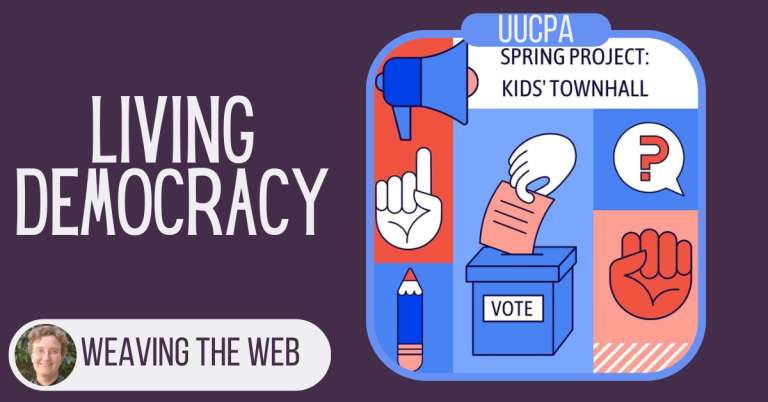Dear UUCPA folks,
Sometimes when I’m typing or writing the date and I get to that “2024,” I wonder, “How will this year go down in history?” It seems inevitable that for good or ill, 2024 will be one of those years to remember, like 1941, 1865, and 1776. How can it not be, when November’s election will be a referendum on the question: do we still want to have a democracy?
This is so important to us at UUCPA that we are devoting a great deal of our programming to developing the skills of democracy and putting them into action. A handful of these programs are coming right up. To preserve and improve democracy, there are many things we can learn.
We learn to have conversations about important issues, even when they’re hard: the theme of tomorrow’s service, when we’ll look along the road to peace in Israel and Palestine, and together go a little ways towards that dreamed-of destination. You’ll have a chance to reflect on your own hopes, fears, and questions, and Rev. Cat and I will use them to plan the next stretch of the road.
We learn that democracy goes beyond voting. It also involves identifying areas for change, research into what others think, research into cost and who has power in an area–and those are exactly the skills UUCPA’s children will be acquiring in their spring project. It is called the Kids’ Townhall, and our Children and Youth Religious Education team will ask our young people to take a look around their UUCPA experience and see if there are areas where we should consider changes, and what would it take to make a change.
We learn how to approach our moral choices with increasing wisdom. That’s the aim of What We Choose: UU Ethics, the Adult Learning Journey session Rev. Cat leads tomorrow. After all, if we adults are going to teach children how to imagine and democratically create a better community, we want to live that process.
We learn to “unjudge someone”: the apt slogan of the Human Library, which we’ll be hosting on May 5. If I am not mistaken, it is the first Palo Alto appearance of this marvelous phenomenon that began in Denmark and has spread throughout the world. You can borrow a person the way one borrows a book: a person who has volunteered to represent a group they belong to, one marked by stigma or prejudice. By asking them the questions you have about their group, you have a chance to discuss taboo topics openly and without condemnation. (You can also be a book in the Human Library! If you’re interested, I’ll put you on that path. I’ve been a book myself, and it’s a great experience.) Imagine a United States of America where people have crossed these bridges to better understanding and less judgment.
These are just a few of the ways we’ll be learning and living democracy in 2024. Which ones will you join?
Blessings,
Amy

